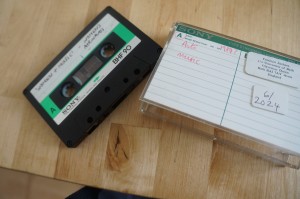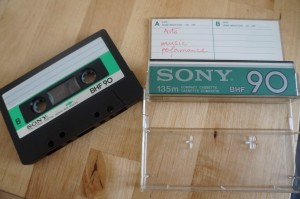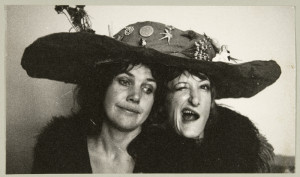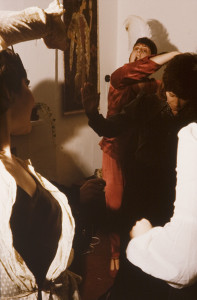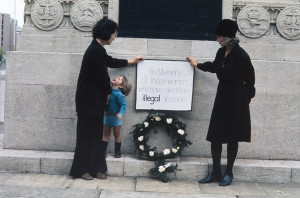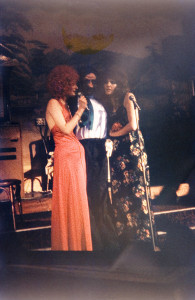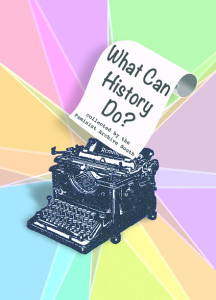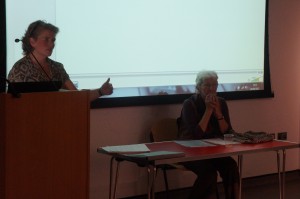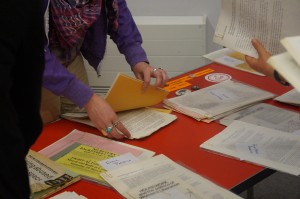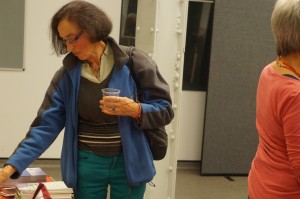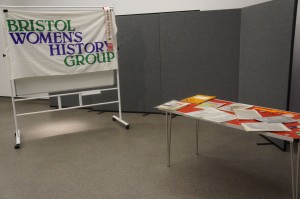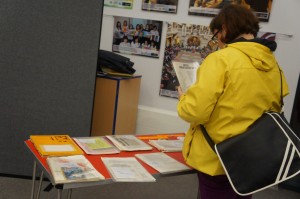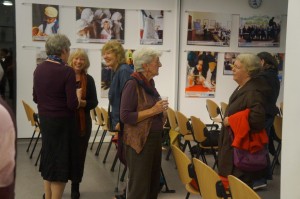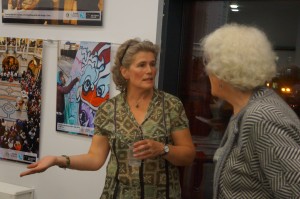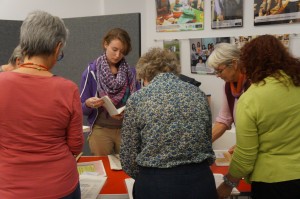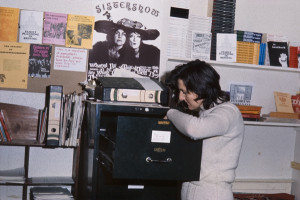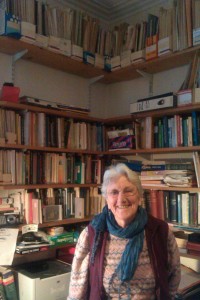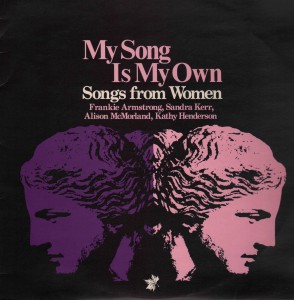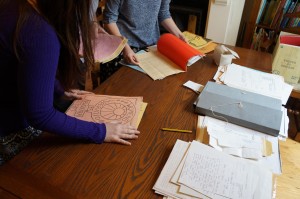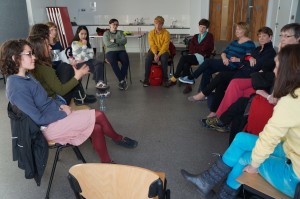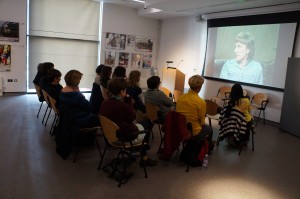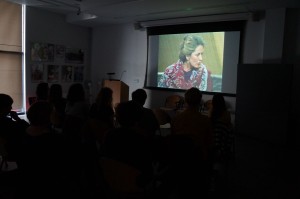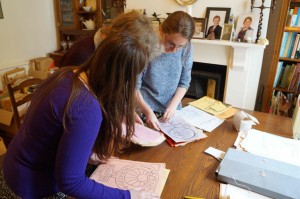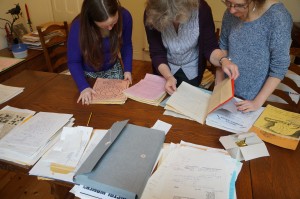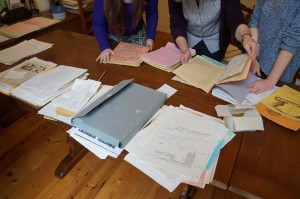On Saturday 20 July we held the last workshop in the Feminist Archive South Spring/ Summer workshop series run as part of the Ellen Malos’ Archives project.
We’ve held a range of workshops and events over the past few months, including the history of feminist print media, film showings, archiving contemporary feminist activism, and singing with Frankie Armstrong.
For the last workshop we explored the history of Bristol Women’s Aid with Ellen Malos and Jackie Barron, unfortunately Nicola Harwin was unwell so she couldn’t join us – get better soon Nicola.
Here is some personal impressions of the workshop written by me (that’s debi, by way…)
The early history of women’s aid in Bristol has been fairly well recounted on this blog – a single bed that happened to be in the Women Centre in 1973 was the seed from which Women’s Aid in Bristol grew. The centre often received calls from the police and the Samaritans to see if they could help women and children who were experiencing domestic violence, and it soon became clear that there was a real need for services to help vulnerable women in Bristol. Women and their children would take refuge in the centre for a few nights, but as the centre was a busy place they could not stay there all the time. In 1973 there was literally no support, and no understanding of the abuse women suffered, and it was commonly stated by authorities that women should just ‘go home’ to their violent partners.
As the calls to the women’s centre became more frequent, WLM activists began searching for a property where women could live safely. This became known as the ‘Women’s House Project.’ Recounting the early histories of women’s aid demonstrated how ‘women’s safe houses’ acted as spaces of mutual aid and co-operation, embodying many of the political ideals of the women’s movement as the first point on the document illustrates: ‘the house will be run on a day to day basis by the women in residence.’
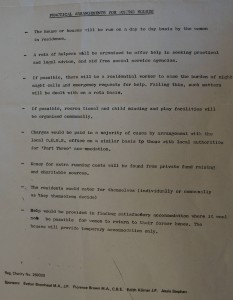
The workshop revealed how WLM activists invented language to describe and analyse violence against women, including the very term we use today – ‘violence against women.’ Some of this language, such as ‘battered women’ now seems out-dated, and we reflected in the workshop on how terminology has changed as more became known about the field.
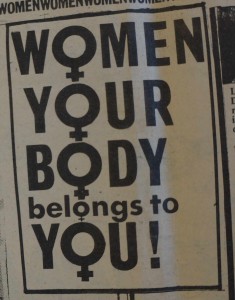
It might be worthwhile here to just pause a minute and consider: can you imagine living in a culture where there was no language to describe certain kinds of violence? As one contributor, who had been very involved in the development of women’s services in Bath commented, the analyses emerging from the WLM ‘prised open the private domain’ as an arena where women and children can experience physical and emotional violence.
A major part of the development of women’s aid and related services was research and policy reform. As Ellen was keen to state, women in the movement had no previous knowledge of law or social policy so they had to pick things up as they went along. This meant learning how the complex machinery of the state worked, negotiating dense bureaucracy and exercising immense powers of diplomacy. As Ellen jokingly reflected, she developed the skill to sit in meetings with sexist men, resist the urge to strangle them and maintain working relationships that helped them make incremental gains in attaining vital services for women.
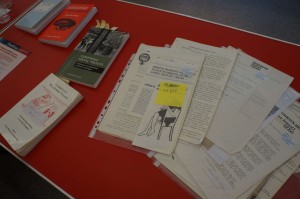
I asked Ellen if she felt there was any tension between working so directly to reform patriarchal law and the aims of the wider movement that attempted to revolutionise the whole of society. As a socialist, Ellen personally felt there was no contradiction in pursuing such a course of action, but she did suggest there were people in the movement who were critical of these strategies. Ellen emphasised however that the women’s aid movement did not operate solely to change the law. It also aimed to change cultural perceptions and behaviour so that we can live in a world where violence against women is understood to be completely unacceptable. This is clearly an area where activism is vibrant in contemporary feminism, but there is still a very very long way to go before this aim is realised.
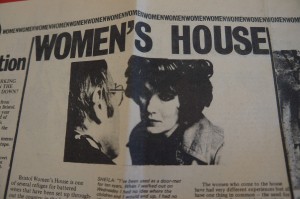
A revealing conversation from the afternoon focused on how the austerity measures implemented by the coalition government risk creating a situation where women’s financial independence will be curtailed, which could potentially mean women stay in relationships with violent partners. The introduction of a single payment of Universal Credit in October 2013 decrees that benefit payments can only be paid to one person per household, and does not stipulate the gender of the person money should be paid to.
Feminists have long emphasised the importance of women’s financial independence through benefit payments. Eleanor Rathbone argued for a system of family allowances paid directly to mothers as early as 1918. When threats to family allowance were tabled in the 1970s, women in the WLM mobilized to ensure that payments were still paid to the mother. The change to how benefit payments are structured in the UK may mean that payments go the man, therefore eroding what for some women is crucial access to financial autonomy.
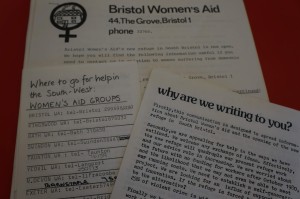
Such changes in welfare policies demonstrate that the struggle for equality and cultural transformation at the heart of feminist politics is a continuous one. Advances can be made but they can also be retracted, particularly in an age of austerity where women’s freedoms are surplus to financial requirements. The workshop also demonstrated to me that understanding these struggles in a wider historical context is crucial, so that we can better understand how feminist incisions can be made in political and cultural life.
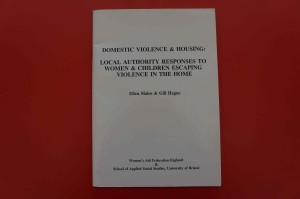
This was one of the first pieces of research to explore how local authorities were implementing laws to protect women escaping violence in the home
I hope that the plans to write the history of Bristol Women’s Aid is realised quickly. Contemporary activists would benefit from knowing how to make policy interventions and transform the law. It is clear that the current government is unpicking just about every progressive piece of legislation made in the 20th century. Sharing such knowledge and skills across feminist generations is vital for understanding the varied strategies of committed resistance women have collectively practiced throughout history. As I said earlier, the fight for equality and cultural transformation is a continuous one, and recording and sharing what we have done is an integral part of sustaining political action.

